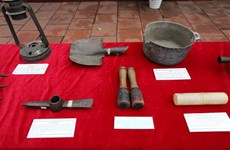Model supporting women suffering gender-based violence to be multiplied
The Ministry of Labour, Invalids and Social Affairs will multiply nationwide a comprehensive support model for women and girls experiencing gender-based violence. The model covers the areas of primary health care, consultancy, welfare, security, and justice.

At the closing workshop of the project on “Building a model to respond to violence against women and girls in Vietnam.” (Photo: VietnamPlus).
Hanoi (VNA) - The project on “Building a model to respond to violence against women and girls in Vietnam,” has been effectively implemented and will be multiplied across the nation.
As heard at the project closing workshop held on October 20, tangible outcomes it has achieved so far were attributable the close collaboration among the Ministry of Labour, Invalids and Social Affairs (MOLISA), the Korea International Cooperation Agency (KOICA), and the United Nations Population Agency (UNFPA) in Vietnam.
The project aimed at raising public awareness of violence, particularly sexual violence against women and girls. Its aim was to change people’s attitudes and behaviors toward gender-based violence. It was also designed to function as a centre to provide essential and integrated services for survivors of gender-based violence, the first-ever model in Vietnam.
After nearly four years of implementation (2017-2021), more than 10 million people have been provided knowledge of gender-based violence, particularly sexual violence against women and girls. This was done through three annual national communication campaigns, which were part of the National Action Month on Gender Equality and Prevention and Response to gender-based violence (from November 15 – December 15 annually). Industrial zones in the northern coastal province of Quang Ninh were also targeted to institute a culture of zero tolerance for sexual harassment at workplaces.
The model of “Anh Duong House” began operations in April 2020 as part of this project. It has accommodated more than 300 women and children who are survivors of gender-based violence. It serves as a one-stop service centre, providing comprehensive services, including health care, counselling, social welfare, protection, and judicial services. Its hotline, which is available 24/7 and free of charge, receives more than 1,000 calls a month.
 A victim of gender-based violence consulted by a staff at the Anh Duong House (Photo: VietnamPlus)
The Anh Duong House has been managed by the Quang Ninh Provincial Social Work Centre under the provincial Department of Labour, Invalids and Social Affairs, with technical support from MOLISA, UNFPA and KOICA. As planned, the model will be multiplied in Ho Chi Minh City, Da Nang, and Thanh Hoa. About 500 service providers have been trained on how to provide support for women and girls who are subjected to violence. In addition to providing emergency support for the protection of the rights of women and girls subject to violence, the centre has provided referrals and social welfare support to ensure the livelihood for the vulnerable groups.
A victim of gender-based violence consulted by a staff at the Anh Duong House (Photo: VietnamPlus)
The Anh Duong House has been managed by the Quang Ninh Provincial Social Work Centre under the provincial Department of Labour, Invalids and Social Affairs, with technical support from MOLISA, UNFPA and KOICA. As planned, the model will be multiplied in Ho Chi Minh City, Da Nang, and Thanh Hoa. About 500 service providers have been trained on how to provide support for women and girls who are subjected to violence. In addition to providing emergency support for the protection of the rights of women and girls subject to violence, the centre has provided referrals and social welfare support to ensure the livelihood for the vulnerable groups.
Commenting on the significant contributions of the Project, Deputy Minister of Labour, Invalids and Social Affairs Nguyen Thi Ha stressed: “The Government of Vietnam has always made every effort to implement necessary measures to ensure social security, promote gender equality, and prevent and respond to gender-based violence, particularly violence against women and girls. These efforts have been highly appreciated by international organizations. Under the country’s policies to support people and businesses to overcome difficulties caused by the COVID-19 pandemic, women and children are always the prioritized targets and have received better support packages, particularly pregnant women, COVID-19 infected women, and pandemic orphans. This has contributed to making their lives stable and has reduced the pressure and risks of being subjected to violence and/or abuse. MOLISA commended the project’s outcomes. This project constitutes a highlight in the cause of gender-based violence prevention and response, contributing to achieving the national objectives on gender equality. The project has also laid a practical foundation for the development of policies on gender equality and gender-based violence prevention and response.”
UNFPA Representative in Vietnam Naomi Kitahara confirmed UNFPA's commitments to the Government of Vietnam’s efforts to stop gender-based violence against women and girls so that they can live a dignified life free of violence. This will achieve the 2030 agenda on sustainable development, leaving no one behind./.
As heard at the project closing workshop held on October 20, tangible outcomes it has achieved so far were attributable the close collaboration among the Ministry of Labour, Invalids and Social Affairs (MOLISA), the Korea International Cooperation Agency (KOICA), and the United Nations Population Agency (UNFPA) in Vietnam.
The project aimed at raising public awareness of violence, particularly sexual violence against women and girls. Its aim was to change people’s attitudes and behaviors toward gender-based violence. It was also designed to function as a centre to provide essential and integrated services for survivors of gender-based violence, the first-ever model in Vietnam.
After nearly four years of implementation (2017-2021), more than 10 million people have been provided knowledge of gender-based violence, particularly sexual violence against women and girls. This was done through three annual national communication campaigns, which were part of the National Action Month on Gender Equality and Prevention and Response to gender-based violence (from November 15 – December 15 annually). Industrial zones in the northern coastal province of Quang Ninh were also targeted to institute a culture of zero tolerance for sexual harassment at workplaces.
The model of “Anh Duong House” began operations in April 2020 as part of this project. It has accommodated more than 300 women and children who are survivors of gender-based violence. It serves as a one-stop service centre, providing comprehensive services, including health care, counselling, social welfare, protection, and judicial services. Its hotline, which is available 24/7 and free of charge, receives more than 1,000 calls a month.
 A victim of gender-based violence consulted by a staff at the Anh Duong House (Photo: VietnamPlus)
A victim of gender-based violence consulted by a staff at the Anh Duong House (Photo: VietnamPlus)Commenting on the significant contributions of the Project, Deputy Minister of Labour, Invalids and Social Affairs Nguyen Thi Ha stressed: “The Government of Vietnam has always made every effort to implement necessary measures to ensure social security, promote gender equality, and prevent and respond to gender-based violence, particularly violence against women and girls. These efforts have been highly appreciated by international organizations. Under the country’s policies to support people and businesses to overcome difficulties caused by the COVID-19 pandemic, women and children are always the prioritized targets and have received better support packages, particularly pregnant women, COVID-19 infected women, and pandemic orphans. This has contributed to making their lives stable and has reduced the pressure and risks of being subjected to violence and/or abuse. MOLISA commended the project’s outcomes. This project constitutes a highlight in the cause of gender-based violence prevention and response, contributing to achieving the national objectives on gender equality. The project has also laid a practical foundation for the development of policies on gender equality and gender-based violence prevention and response.”
UNFPA Representative in Vietnam Naomi Kitahara confirmed UNFPA's commitments to the Government of Vietnam’s efforts to stop gender-based violence against women and girls so that they can live a dignified life free of violence. This will achieve the 2030 agenda on sustainable development, leaving no one behind./.













